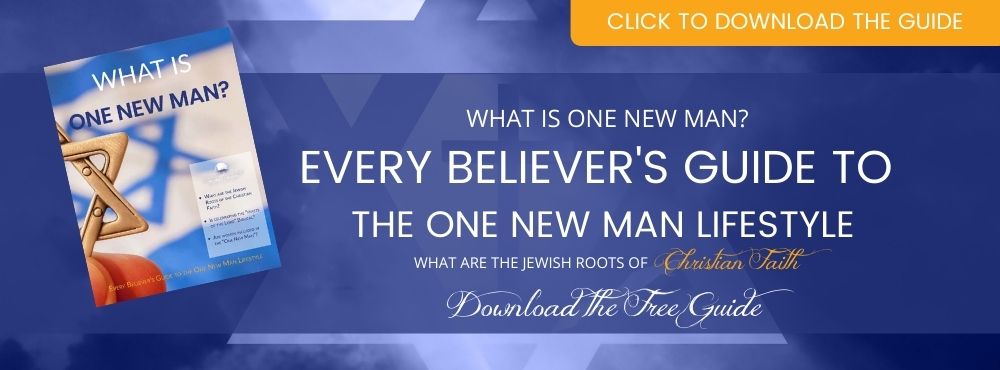“ONE NEW MAN” – What Should this Mean to the Believer? (Part 4)
Table of Contents
The Apostle Paul saw difficulties coming between the Jew and Gentile. He addressed this issue in several of his letters, with Romans 11 being among the clearest statements of his efforts. Unfortunately, habits and traditions sometimes have a way of creeping into our way of thinking. As they become ingrained, it becomes the way of things, and the original documents that we become separated from are viewed and interpreted in line with tradition. The passing of time has a way of reinforcing the ever-growing error allowing pagan mixture to slip in, distorting the overall view. The tradition of Easter is a prime example of this.
Did the “Christian” replace the Jew as the new Israel?
There are those who have embraced the idea that the Gentile Christian became a replacement for the Jew as Israel—commonly known as replacement theology. They would cite historical documents showing the Roman destruction in Jerusalem in 70 AD and the Bar-Kochba rebellion around 135 AD, as God’s total rejection of the Jew.
The difficulty of blending two traditionally opposed peoples—the Gentile and the Jew—builds a natural prejudice on both sides. The Jews had the original mandate to become a people led by God, cohesive and steadfast in the instructions given by God, and then to go out and bring the others (the Gentiles) to the knowledge and acceptance of God’s instruction. They were to be God’s light to the nations.
However, it was easier to remove the Jewish people from Egypt, than it is to remove the Egyptian ways from the Jewish people. The failure to take the Promised Land, drive out and destroy the judged inhabitants, and also to adhere to the instruction of God was just the beginning of their failure to understand and embrace what God’s intention was for them as the ‘chosen’ people. Therefore, do we believe that Christians are God’s ‘Plan B?’ Did the Christian then, replace the Jew as God’s ‘new chosen people, Israel?’
If yes, then what hope is there for Jewish salvation?
If indeed we think that we are part of God’s ‘Plan B,’ we must then separate ourselves from these rejected people. They may be saved, but to do so, they must reject their own heritage, traditions, and even most of their history. The new ‘Christian’ will now need to establish and celebrate separate festivals—avoiding the pitfalls of the ‘rejected Jews’ with their traditions and festivals.
Other theories say that the Old Testament was for the Jew and the New Testament is for the Christian. The Christian and Jew could not mix at all. After all, they say, “It was the Jews who killed Christ.” It would seem then that the Jew was doomed because of this.
If ‘Plan B’ is accepted, then the Christian must have replaced the Jew and there is virtually no hope for the Jew without total rejection of Jewish traditions and faith.
If no, how do we go about reconciling with the Jew?
If Jesus was slain from the foundation of the world, as the Bible says, then there could be no ‘Plan B.’
You must remember in the beloved Christmas story of Luke, Chapter 2, the lineage of both Joseph and Mary was of the line of King David, who is Jewish. Joseph and Mary were Jewish. Jesus, our Savior, was born, grew up, and still is—Jewish! His complete genealogy going all the way back to Adam, “the son of God” is given in Luke 3:23-38.
The New Testament reveals much of the Old Testament and cannot stand on its own without the Old Testament. The Old Testament is the foundation of the Christian belief system and therefore it must be concluded that the Jewish people are foundational to the Christian.
The early Jewish leadership, namely the Apostles, recognized this in Acts 15:6-11, 19-21:
“The apostles and elders met to consider this question. After much discussion, Peter got up and addressed them: ‘Brothers, you know that some time ago God made a choice among you that the Gentiles might hear from my lips the message of the gospel and believe. God, who knows the heart, showed that He accepted them by giving the Holy Spirit to them, just as he did to us. He did not discriminate between us and them, for He purified their hearts by faith. Now then, why do you try to test God by putting on the necks of Gentiles a yoke that neither we nor our ancestors have been able to bear? No! We believe it is through the grace of our Lord Jesus that we are saved, just as they are’…
“‘It is my judgment, therefore, that we should not make it difficult for the Gentiles who are turning to God. Instead we should write to them, telling them to abstain from food polluted by idols, from sexual immorality, from the meat of strangled animals and from blood. For the law of Moses has been preached in every city from the earliest times and is read in the synagogues on every Sabbath’” (emphasis added).
Church leadership by the third century had the written Word of both the Old and the New Testaments. Somehow, they had managed to reason out the Jewish aspect of the scriptures in much the same way that the Pharisees reasoned out God’s commandments in Jesus’ day. The Gentile leadership had begun to substitute the traditions of men for the instruction of the Word. This reasoning placed a burden on the Christian which lead to mixture.
This division from the Jew has resulted in multiple divisions within the Christian religious structure.

So, what does all of this have to do with the One New Man?
Ephesians 2:11-18 says:
“Therefore, remember that formerly you who are Gentiles by birth and called “uncircumcised” by those who call themselves “the circumcision” (which is done in the body by human hands)— remember that at that time you were separate from Christ, excluded from citizenship in Israel and foreigners to the covenants of the promise, without hope and without God in the world. But now in Christ Jesus you who once were far away have been brought near by the blood of Christ.
“For He Himself is our peace, who has made the two groups one and has destroyed the barrier, the dividing wall of hostility, by setting aside in His flesh the law with its commands and regulations. His purpose was to create in Himself one new man out of the two, thus making peace, and in one body to reconcile both of them to God through the cross, by which He put to death their hostility. He came and preached peace to you who were far away and peace to those who were near. For through Him we both have access to the Father by one Spirit” (emphasis added).
Just as Jesus prayed to the Father for our unity in John 17, the Apostle Paul speaks of us all having access to the Father by one Spirit. If we keep placing barriers between us and the Jew, why should we believe that there are no barriers between our various denominations, and as such, barriers between us and God?
To reject the Jew and to reject the Feasts of the Lord, means that we are rejecting the blessings of the Lord and ultimately becoming powerless. We must embrace the totality of God’s Word, which includes embracing the Jew, in order for us to have all that God has promised us through the Jew… or we remain powerless and pathetic.
- How do we embrace the Word of God?
- How do we embrace each other?
- How do we embrace the Jew?
- Is reconciliation possible?
These will be the final points of discussion in Part 5 of this series: The One New Man: What Should this Mean to the Believer?
